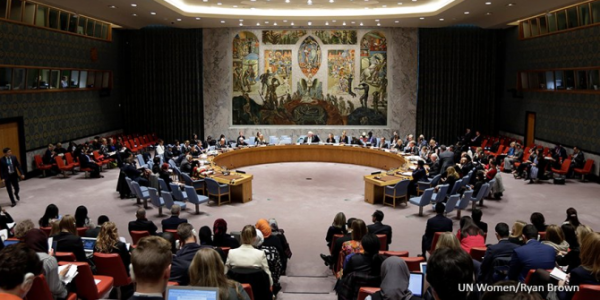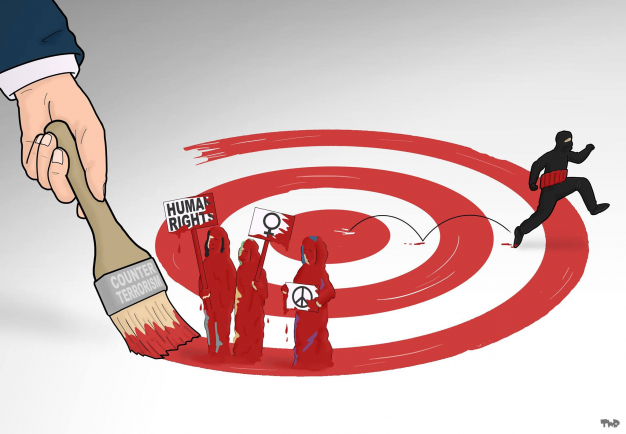Column by WPP Staff
As usual, late October this year, the Security Council held its annual open debate on Women, Peace and Security and the implementation of UN Security Council Resolution 1325. One year after the publication of the Global Study[1], which has been part of the UNSCR 1325 High-level Review, the majority of the Member States speaking emphasized the important role women have to play in peacebuilding efforts, with the majority of countries advocating for more cooperation with and support for women’s grassroots civil society organisations.[2] In addition, several countries pointed out the lack of adequate funding for women’s local peace initiatives.
What was missing in the debate, was a linking of the “shrinking space for civil society” discussion to the current status of the WPS agenda. And, in particular, how these shrinking space developments are creating additional hurdles for women activists and their organizations - including at the grassroots level - to engage in nonviolent action and movement building for peace.
The shrinking of civil society space worldwide is currently a hot topic of discussion. The attacks on this space come from different actors, such as governments, the security sector, corporations, extremists, or a combination of these.[3] Although restrictions are directed at civil society as a whole, not all civil society has been attacked or affected in the same way. Rather, what we see is that for activist groups and individual activists who are challenging the status quo, the situation is deteriorating.[4]
Women activists, who are working for women’s rights and peace, are often among those feeling the brunt of deteriorating civil society space. They are often being targeted in a particular – gendered – way; stigmatizing and punishing them for stepping out of their traditional gender roles into the public domain, where they challenge vested interests and power.
In a fast-changing and increasingly insecure world, fear is an effective tool to justify the implementation of control measures that stall and roll back hard-won human rights. Regularly, this is done in the name of “upholding national security” and “countering terrorism”. In such settings, women activists challenging those in power are increasingly running the risk of being accused of “acting against public interests and national security”, which can end up in categorizing them as “enemies of the state” and even “terrorists”.
As the Global Study highlighted, increasingly women activists find themselves squeezed between on the one hand conservative forces, extremist ideologies and terrorist activity on the ground, which targets women in general and women’s rights organizing in particular as it is seen as a direct challenge to these ideologies, interests and activities. On the other hand, women’s rights organizing is increasingly being impacted by counterterrorism measures introduced by countries around the word.[5]
In particular, the Global Study warned that in many countries, counterterrorism regulations and measures are compromising human rights standards and norms of international humanitarian law.[6]
One of the challenges that have arisen for women’s organizations worldwide concerns counterterrorism financing (CTF), which might not be so visible at first glance. For many women’s organizations around the globe, being able to receive foreign funding is crucial, as it is often the only means to get financial support for their critical and progressive rights-based work.
The growing trend of governments increasingly restricting the possibility to receive foreign funding through the passing of NGO laws, and the public slandering of organizations that receive such funding as “foreign agents”, is cutting off activists – including women activists - from international funding streams they desperately need to do their human rights and peace work on the ground.
But to only point in the direction of those governments that are using antiterrorism legislation and measures as a means to control and undermine – in particular critical - civil society activism on their territory as the cause of all problems, is falling short of the complexity of the issue.
The way donor governments distribute their funding is also increasingly becoming a hurdle for civil society. Several donor governments have moved to the right; and are linking funds more closely to national interests, which includes the prevention of terrorism and the assertion of trade advantage.[7] In addition, donors are showing a growing preference to channel their funds via large (often international) organizations, making direct access to funding increasingly difficult for medium-sized and smaller organizations. This in turn has a gendered effect – as women’s rights and peace organizations mainly fit the latter two categories. Increasingly, the only way to still gain access to substantive funding for women’s groups, is via subcontracting constructions. This makes women’s organizing increasingly dependent on the goodwill of large institutions to take them on board, which can end up interfering with their feminist, radical, bottom-up, needs-driven and movement-building agenda.
Gender blindness in regards to women’s organizational realities on the ground - who often do not have the capacity to fulfil donor’s increasingly complex bureaucratic requirements - stands in strong contrast to the UNSCR Member States’ enthusiastic pleas for “more cooperation with women’s grassroots organizations” and “financially supporting the activists on the ground”.
Counterterrorism policies and measures also influence the practices of the banking sector[8]. These policies are leading to banks showing risk averse behavior towards the nonprofit sector, out of fear of hefty fines when found out providing financial services to terrorists. As a result, civil society organizations, in particular those working in conflict zones, end up with delays in bank transfers; the imposition of limits on transfers; being asked to provide detailed and at times sensitive project information before release of funds; as well as bank transfers getting blocked altogether by the closing of their accounts or no longer being able to get an account.
As civil society becomes an increasingly “risky” customer in the eyes of banks, women’s often small and underfunded organizations, working in conflict zones, under risky circumstances, easily fall prey to banks’ derisking practices. Often, they have little financial resilience to cope with the consequences, which in turn impacts the communities they are working for.
All in all, the organizational as well as personal impact on women’s rights activists cannot be underestimated. Some women’s organizations are forced to close down, have to go underground, or have to change the focus of their work – dropping their critical civil society activism - to be able to continue operating. Due to a decline in funding, organizations become fierce competitors, which undermines much-needed civil society solidarity during hard times. On a personal level, a constant growing work load in a climate of struggle for survival in an increasingly hostile external environment, combined with the constant fear of becoming the target of violence and retaliation, increases stress-levels and risk of burn-out.
Although the Global Study included recommendations emphasizing the need to monitor the impact of counterterrorism laws and regulations on the operation of women’s civil society organizations, and their access to resources[9], followed by UN Security Council Resolution 2242 adopted in October last year, which also urges “Member States to gather gender-sensitive data on the impacts of counterterrorism strategies on women’s human rights and women’s organizations”[10], to date this call to action does not seem to have been be picked up, when listening to the SC deliberations this year.
Instead what we have seen recently, is a growing call to action to conjoin the Women, Peace and Security agenda with counterterrorism strategies and efforts to combat violent extremism.
Women activists are watching this development with reservations, as they fear that it could lead to women’s rights becoming securitized. Women consulted for the Global Study already pointed out that when women’s activism and advocacy becomes too narrowly defined and closely associated with a government’s counter-terrorism agenda, the risk of not being able to maintain an independent civil society voice, as well as backlash against women’s rights defenders increases.[11] Instead of empowering women activists, it could then end up further increasing their insecurity.
The reality is, that women activists worldwide are already on the frontlines of building peace, addressing injustice, stopping violence and fighting extremism, informed first and foremost by a human rights and human security focus and drive. They have been most successful when they were able to do this in collective settings. As last year’s research by Thania Paffenholz[12] pointed out, effective inclusion of women in peace processes is not just about including individual women at the table, it is very much about effective organizing - a women’s “collective” pushing for peace and increased political will - from below. A key factor of success in terms of inclusive peacebuilding hence lies in the element of “mobilizing and mass action”. The existence of an enabling space for women’s civil society organizing and movement building for peace and human rights is therefore a vital element of the WPS agenda, and needs to be a top priority for those who take it seriously.
16 years after the adoption of UNSCR 1325, and one year after the Highl-level Review, the world needs a holistic Women Peace and Security agenda, more than ever.
This requires Member States to go beyond celebratory commitments that repeat the same messages over and over again, yet do little to address the daunting realities women activists are facing. Realities, which are also the result of increasingly contradictory policies, practices and attitudes of those same Member States towards their civil society counterparts.

[1] http://www2.unwomen.org/-/media/files/un%20women/wps/highlights/unw-global-study-1325-2015.pdf?v=1&d=20160323T192435
[2] http://www.peacewomen.org/security-council/security-council-open-debate-women-peace-and-security-october-2016
[3] http://www.civicus.org/images/documents/SOCS2016/summaries/State-of-Civil-Society-Report-2016_Exec-Summary.pdf
[4] http://www.civicus.org/images/documents/SOCS2016/summaries/State-of-Civil-Society-Report-2016_Exec-Summary.pdf, p. 9
[5] http://www2.unwomen.org/-/media/files/un%20women/wps/highlights/unw-global-study-1325-2015.pdf?v=1&d=20160323T192435, p.224
[6] http://www2.unwomen.org/-/media/files/un%20women/wps/highlights/unw-global-study-1325-2015.pdf?v=1&d=20160323T192435, p. 227
[7] http://www.civicus.org/images/documents/SOCS2016/summaries/State-of-Civil-Society-Report-2016_Exec-Summary.pdf, p.10
[8] See also WPP blog: https://www.womenpeacemakersprogram.org/news/risk-avoidance-for-whom/
[9] http://www2.unwomen.org/-/media/files/un%20women/wps/highlights/unw-global-study-1325-2015.pdf?v=1&d=20160323T192435, p. 231
11 Dec '17 This month WPP staff interviewed Arbia Jebali and Sarah Chamekh from Free Sight Association in Tunisia about the work their organization does, how civil society space has changed over the years, which challenges they are facing now, and how civil society in Tunisia is organizing itself to overcome those challenges.
7 Nov '17 In this article, WPP staff interviewed Doron Joles of XminY Fund, an activist organization that supports social movements, action groups and changemakers fighting for a fair, democratic, sustainable and accepting world. He discusses the unique way they have chosen to hand out funds, and the challenges that go along with funding small activist organizations in the current global climate.

25 Oct '17 This Friday, the UNSCR 1325 Open Debate will take place once again, seventeen years since the adoption of landmark UN Security Council Resolution 1325 on Women, Peace and Security. In this article WPP staff reflects on the progress made for a truly transformative feminist peace agenda until now.
